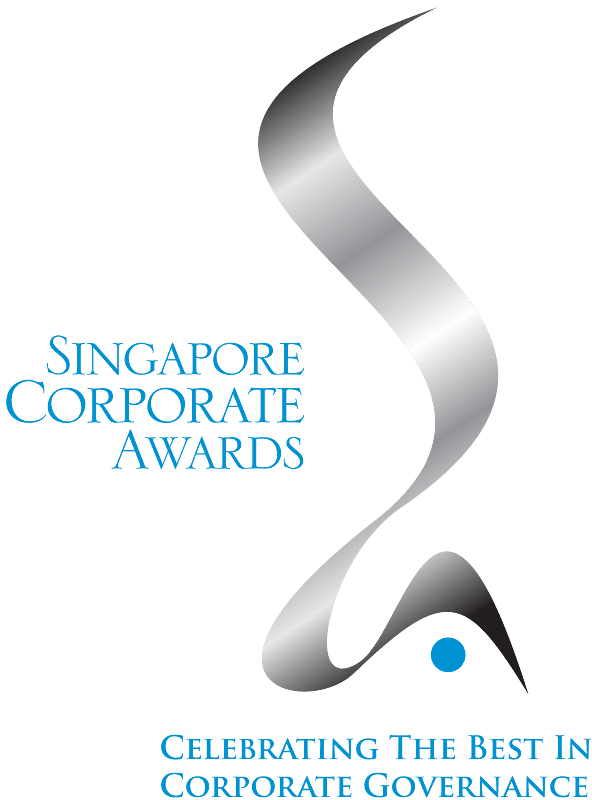Objectives of the Award
- To recognise CEOs who have led an organisation to scale new heights in its respective industry segment, while also achieving excellence in corporate governance;
- To provide examples of CEOs who are able to envision better ways of doing business, inspire employees to achieve excellence beyond their dreams in the products and services they provide, to build their company's brand and presence, and to contribute to the development of their industry.
Categories of the Award
The Award will be presented for the following categories of companies:
- Companies with market capitalisation of S$1 billion and above;
- Companies with market capitalisation of S$300 million to less than S$1 billion;
- Companies with market capitalisation of less than S$300 million.
Selection and Judging Process
The selection for this Award goes through a three-stage process:
In Stage 1, likely candidates will be identified through the following sources:
- Nominations;
- Media reports and industry knowledge;
- Rankings of the CEO companies in the ASEAN Corporate Governance Scorecard and the Singapore Governance and Transparency Index;
- Performance of the CEO companies.
A preliminary shortlist of candidates are developed using the criteria (described below).
In Stage 2, additional inputs on shortlisted CEOs are obtained through research and discreet inquiries. A final shortlist is then developed for the judges in Stage 3.
In Stage 3, a panel of judges will review and evaluate the shortlisted candidates. The judges will consider the information from the prior research using the criteria developed.
Criteria
As nominees may come from any industry segment, where states of the market as well as measuring yardsticks differ, the criteria for evaluation will focus more on qualitative and behavioural traits.
Specifically, the Best Chief Executive Officer nominees will be evaluated on the competencies listed below.
Governance
The CEO sets a tone of excellence in corporate governance through personal example and upholds a strict code of business ethics throughout the organisation. He/she builds high standards of governance, controls and accountability into the execution of business growth and expansion plans.
He/she is able to maintain the right balance in relationship between board and management with a view to enhancing effectiveness. We will look at how the CEO acts as a true advocate of best-in-class board practices within the firm and in the business community.
Performance
The CEO must have delivered best-in-class performance, evidenced by having broken new grounds to improve delivery and/or has dealt with critical situations to turnaround business. Large-scale improvement of results is achieved by substantial change to the operating process of the organisation, especially in an environment of continual reinvention. In some instances, it is not just about improving the business, but transforming it or creating a new standard.
Strategy
The CEO has articulated a vision and has built strategy in anticipation of crisis. He/she is able to think strategically and lead change in the organisation to achieve that vision. Based on the vision, the CEO should have developed a high-impact corporate strategy by integrating market, competition, trends, and other factors to create a competitive advantage for the company. He/she should also have a vision and track record of building sustainable strategy for digital innovation and cybersecurity best practices to create a resilient and trusted cyber environment for the organisation.
Succession Planning, Talent Management & Development
The CEO is the key driver of talent management. He/she should have succession planning, particularly at the C-suite level, at the forefront of his/her agenda, and actively identifies and develops the next generation of the executive team. The CEO systematically builds team capability, in terms of understanding the capabilities of immediate team members and reaching out to develop promising team members at other levels. He/she ensures the organisation trains and nurtures talent with a view to retaining institutional domain knowledge. He/she also creates corporate cultures that are diverse and inclusive.
Corporate Social Responsibility
The CEO is committed to making a positive impact on the economic, social and environmental well-being of the society in which his/her business operates. He/she promotes greater environmental responsibility, corporate philanthropy, volunteerism and community outreach programmes. He/she fosters the practice of corporate social purpose and sustainability within the organisation.
For more information, please contact the Singapore Institute of Directors:
Mr Edwin Lee
Email: edwin@sid.org.sg
DID: 60110100 / 64221188
Singapore Institute of Directors
168, #11-03 Robinson Rd, Capital Tower, 068912

